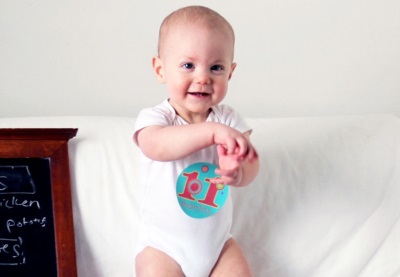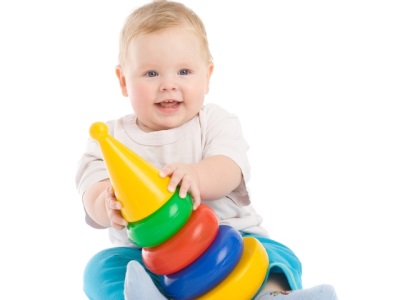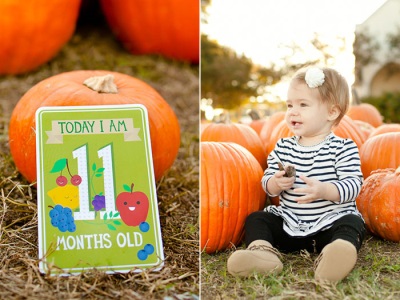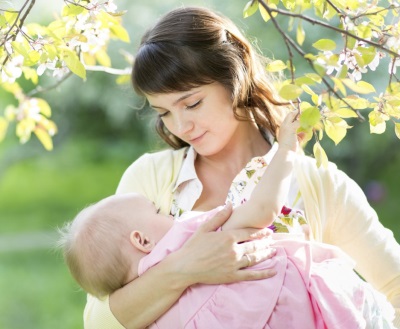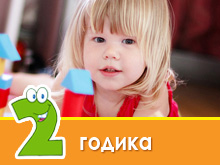Child development at 11 months
Eleven-month child pleases parents with independent steps and simple words. Children of this age are actively developing both physically and emotionally, reinforcing previously acquired skills and mastering new skills. Let's find out how parents can determine if a child is developing normally for 11 months and how to stimulate further development baby of this age.
Physiological changes
- The muscular system of the child by 11 months is so strong that it allows the baby to hold and move the body in a vertical position, that is, to stand without support and walk.
- Most 11-month-old babies already have four teeth. However, someone began to appear following teeth (second incisors), and someone did not even have the first tooth. These are variants of the norm and one should not worry about the age of one.
Physical development
During the eleventh month of life, the weight gain of the child averages 400 grams, and height is about 1.5 centimeters. An increase in the circumference of the chest and head occurs by about 0.5 cm.
The growth rates of different children, of course, are different, but to determine if the baby is developing normally, there are limits to the norm and average values of physical development indicators. The main of these indicators you will find in this table:
Indicator | Average of 11 months | Boys in 11 months | Girls at 11 months |
Weight | 8700-9400 g | 7600-11700 g | 6900-11200 g |
Growth | 72.8-74.5 cm | 69.9-79.2 cm | 67.7-77.8 cm |
Head circumference | 44.6-45.8 cm | 43.2-48.3 cm | 41.9-47.3 cm |
Chest circumference | 47.8-48.4 cm | 45.6-52 cm | 45.8-50.8 cm |
For the musical development of the child conduct classes on the method of "Tsvetonik" Lazarev M. L.
What baby can?
- Eleven-month baby is actively and very much moving. A new toddler's skill is the skill to stand without the help of an adult or holding onto a support. In addition, the toddler is already walking quite well, holding not for her mother's hands, but only for one. To get a favorite toy from the floor, the child will no longer fall, but will stoop or sit down. Some children have already started walking without support.
- With toys, an 11-month-old baby manipulates skillfully and very cleverly. Grabbing an item, the baby opens his hand according to the size of the item. Karapuz already manages to put cubes in a small tower, assemble a pyramid, open boxes, take small objects from the floor or from the table with two fingers.
- The child loves music, so he likes different musical toys. Having heard a rhythmic melody, the baby will begin to dance to the beat.
- Scarce is interested in books and for a long time looking at illustrations in them.
- At her mother's request, the child can show parts of the body and perform many actions and movements that he learned and saw before. For example, a baby shakes a doll, waves good-bye, makes “ladies”, removes socks, unzips a jacket, finds a toy hidden under a blanket or in a box.
- The baby's speech is becoming more and more emotional and diverse. The words consisting of 1-2 syllables appear in it.
- The child understands what his mother says. He rejoices violently when he is praised, and also immediately reacts to a strict tone.
- Baby in 11 months is becoming more independent. The baby gradually learns to dress and wash face, brush teeth, eat with a spoon.If the baby needs something, he no longer just cries, but points to an object with his finger, shakes his head (affirmatively or negatively), and also says simple words.
To check whether an 11-month baby is developing normally, you need to:
- Evaluate whether the child sits well, crawls on all fours and stands at the support.
- Show the child a closing box in which in front of the crumbs to hide a toy. The child should notice that the item has disappeared and try to find it.
- Check whether the child is able to imitate the movements of adults who previously showed him. For example, a baby should try to eat with a spoon, comb, wash face.
- To offer the crumbs to put down the tower of cubes. The kid should already be able to put 2-3 cubes on each other.
Classes for development
- Stimulate both crawling and walking a child. Put a ribbon on the floor and offer the baby to step over it (hold the child by one hand). Let the baby also go for the stroller, the ball, move with the toy-wheelchair.
- Do not miss the opportunity to walk with the crumbs on the stairs. Many kids climb the stairs quite easily, but they may not be able to go down yet.
- Pay a lot of attention to the development of karapuz motor skills and exercises for small fingers. Let the crumb pour the cereal from one cup to another, picking it up with a spoon. Let the child draw on a tray of flour, suggest putting rings on your fingers and your fingers, and also collecting a pyramid.
- When swimming, give a toddler a ladle or a sieve and offer to catch floating small toys in the water.
- Give the child a toy wrapped in a paper napkin or foil, and then offer to unfold it. Also give the baby the opportunity to open the boxes and cans with screwcaps.
- Play with the child in the plot games, for example, you can feed the bear together, wear a vest or hat on the doll. In such games you can show the little one different situations, for example, the bunny asked the bear for the cube and the bear shared the toy, the doll fell and cried, it hurts.
- Draw and sculpt with baby. Give for this child thin pencils, crayons or felt-tip pens, as well as salt dough and safe soft clay.
- Support the development of the baby's speech by constant communication with the child. Call the toys that you give or show to your child, show the Doman cards, comment on your own actions.
- Allow a little time to read together every day. Ideally, the baby should have its own shelf for books, to which the crumb can reach out to choose a book. Often read the child out loud, as well as tell stories by pictures.
- If you went with an 11-month-old baby shopping, show your baby different products, and also give your baby the opportunity to put several items in a basket or trolley.
- Do not miss the opportunity to talk with other kids. Come out for a walk to the site, invite families with children to visit, make new acquaintances.
Care
- Every morning, the 11-month-old toddler begins with washing, brushing teeth, combing.
- Regularly plant the crumb on the pot after sleep, accustoming him to this habit, but do not insist if the kid ignores the pot or is even afraid of it.
- After the toilet, be sure to wash your baby.
- When necessary, trim the crumbs of hair and nails, clean the ears.
- It is not possible to bathe a child at this age not every day, but daily bathing can be an important element of an evening ritual, then you should not abandon it.
- For hardening use the room airing before bedtime, air baths, daily walks, wiping, bathing, dousing and other procedures that the crumb met earlier.
- Do not refuse to conduct massage and gymnastic exercises. At 11 months, babies still need them every day.
Daily regime
At 11 months, children need 14-15 hours of sleep per day. For about 10 hours, a child of this age sleeps at night, and during the daytime two dreams lasting about 1-2 hours last. Twice a day, with an 11-month-old baby, they go for a walk, organizing it so that part of the walk the child sleeps on the street (at least one day’s sleep), and part of them spend it actively. It is recommended to go for a walk with the baby at 10-11 o'clock in the morning and at 16-17 o'clock in the afternoon.
In the organization of wakefulness of a child of this age take into account the time of day. In the morning they spend gymnastics, active games, educational activities, and after lunch the pastime of the baby should be calmer. It is recommended to observe the nightly ritual of laying, which will facilitate the sleeping of the toddler. Such a ritual may include bathing, reading, and other activities that are repeated daily in the same order.
Eating an 11-month-old baby is still five times a day. Between meals usually passes from 3 to 4 hours, while you should try to feed the baby at about the same time every day (deviations up to 30 minutes are acceptable) and not allow breaks of more than 4.5 hours.
To determine the total amount of food that should be given per day to a child of this age, the crumbs weight is divided by 9. On average, children of 11 months eat from 1000 to 1200 ml of food per day. This volume is distributed to the number of feedings, receiving an average portion of 200-240 ml.
The menu of formula-fed babies and babies who continue to breastfeed at the age of 11 months almost coincides, with the only difference that during the first and last feeding the baby is given either a mixture or breast milk. In addition, infants who receive mother's milk are often applied to her mother's breast at night at this age, and the artificial children usually sleep without feeding all night.
Breastfeeding at this age varies slightly due to the increase in the amount of consumed baby food. The peanut is applied throughout the day to her mother's breast for a few minutes, and can also drink any food with breast milk. At night, the child actively sucks in the sleep in the morning.
About baby menu at 11 months read more in another article.
Typical day
As the child grows up the first year of life, spending days with the baby becomes more and more interesting. Thanks to the organization of the daily regimen, the nervous system of the baby develops normally, and the mother manages to do more, regularly engage with the baby, and also ensure the baby has a good sleep and good appetite. Of course, the regime will be different for each individual toddler, but as an example, we offer one of the options for the daily routine with a child of 11 months of age:
7: 00 | Awakening. The first meal, including, depending on the type of feeding, either a mixture or breast milk. |
7: 30 | Hygiene procedures. Wake and gymnastic exercises. |
10: 30 | The second meal, in which the child usually gets porridge, yolk, fruit puree, fruit juice and butter. |
11: 30 | Walk, during which the child sleeps in the fresh air. |
14: 30 | The third meal, during which the child is offered vegetables in the form of soup or mashed potatoes, meat dish (twice a week it is replaced with fish dishes), vegetable oil, bread and fruit juice. |
15: 00 | Wakefulness period with educational games. |
16: 00 | Walk, part of which takes the second dream of the baby in the fresh air. |
18: 30 | The fourth meal, during which kids get a fermented milk drink, fruit puree, cookies and cottage cheese. |
19: 00 | Wakefulness period with calm games. |
21: 30 | Bathing. |
22: 30 | The fifth meal, including, depending on feeding mother's milk or a mixture. Preparing for night sleep and laying down. |
Night time | Breastfed babies are applied to the mother's breast in a dream several times, and the artificial babies usually do not wake up for feeding. |
For information on how to teach your baby to walk and whether or not to use a walker, see the “Live Healthy!”
Frequent problems
- Injuries and fears after a fall. Crumbs, making the first steps, often fall, which is dangerous not only the appearance of injuries, but also the cessation of attempts to walk because of fear. Be close to the child and never leave the baby in the room alone, and calm and distract the fallen toddler. If a child is injured when falling, be sure to observe the condition of the baby and, if serious, show the baby to the doctor.
- Refusing food in chunks. Many babies are so accustomed to grinded and shredded food that they literally choke on any inhomogeneous food. For a while, discard the products with pieces and chop up all the food for the child, and then gradually start offering crumbs solid food, such as drying, peeled carrots, boiled potatoes, an apple slice, and baby cookies. Do not worry if the baby will still refuse to pieces, because he only learns to chew. Perhaps the failure of the crumbs associated with cutting teeth or other health problems, so if the use of the baby only chopped products bother you, you should consult with your doctor.
- Disclaimer of any products. At 11 months, the child has already formed their own preferences in food, so you should not insist if a product does not like a crumb. The best way out would be to exclude such a product from the menu for a while and then offer it to the child again.
Tips for parents
- Many children, who crawl quickly, are in no hurry to make the first independent steps, because it is easier for them to move on four limbs. No need to worry and insist that the crumb began to walk faster. In addition, research has shown that long-crawling babies start talking earlier, and their posture is better.
- For sure the first steps of the child should take care of comfortable and high-quality shoes. She should have a solid heel and a solid non-slip bending sole. In the summer, offer your baby a walk barefoot on grass, sand and other uneven surfaces.
- Patiently teach the crumb to independence. Let the baby learns to dress, eat with a spoon, collect toys, wash himself, help his mother in the kitchen.
- At 11 months, it is time to think about organizing a baby’s first birthday You still have enough time to make the holiday interesting and not too tiring for the toddler.
Diversify your day with lessons on the “Little Leonardo” method. O. Teplyakova, an expert in intellectual development

